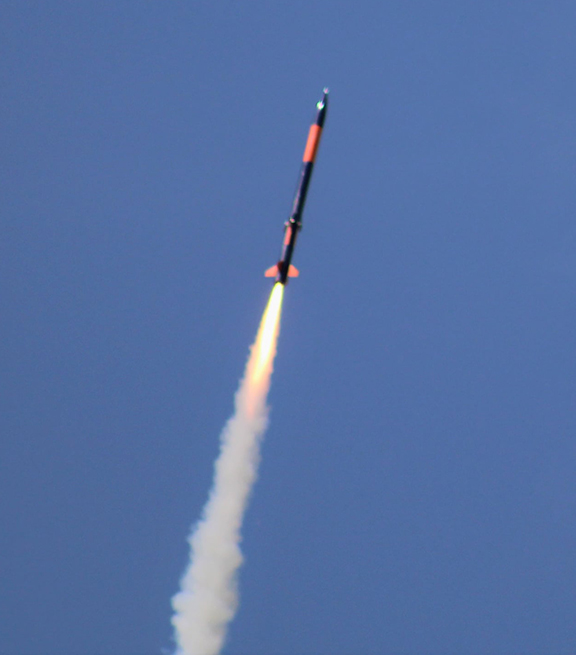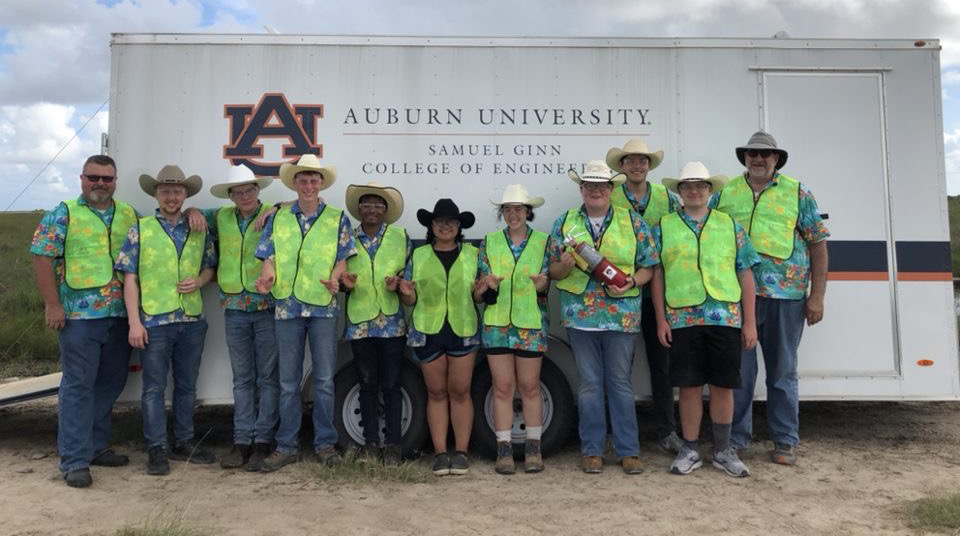Auburn rocketry team takes 12th out of 76 teams at prestigious Spaceport America Cup
Published: Jul 20, 2021 2:00 PM
By Joe McAdory
What’s 12 feet long, 6 inches in diameter and soars to 9,200 feet above Earth at a top speed of 507 mph? It’s “Aurea II”, the carbon fiber and fiberglass rocket created by a team of engineering students in the Auburn University Rocketry Association (AURA).
Nine AURA members recently took the club’s creation (named after Auburn University’s mascot golden eagle) to Spaceport America’s annual collegiate competition June 26 in Alvin, Texas, where they finished 12th out of 76 teams overall and in 5th place in the “Commercial Off the Shelf” category. This comes after months of preparation – utilizing safety protocols to build a competitive rocket despite the pandemic.
 The Spaceport America Cup, previously held near White Sands, New Mexico, from 2017-19, is the world’s largest intercollegiate rocketry engineering contest.
The Spaceport America Cup, previously held near White Sands, New Mexico, from 2017-19, is the world’s largest intercollegiate rocketry engineering contest.
“We were very proud to represent Auburn University and the Ginn College of Engineering with our successful launch and showing before a field of peer engineers and rocketeers,” said Dustin Harris, project lead and AURA president, and a rising senior in aerospace engineering. “Our performance serves as a reminder that aerospace engineering at Auburn is among the best programs in the nation.”
Jack Kovryzhenko, who is now seeking a doctorate in aerospace engineering from Auburn, designed the rocket’s control system as an undergraduate with a mix of aluminum and 3D printed components.
“We made sure the rocket flew to its proper altitude by deploying air brakes and adjusting speed,” explained Kovryzhenko, who has served as AURA’s team lead for embedded systems since 2018. “Our system is operating as a data collection module and it was using all of the on-board sensors needed for controlling the vehicle and collecting additional information about the flight.”
Rocket competitions such as Spaceport America Cup and NASA’s annual University Student Launch Initiative (USLI) offer more than trophies and program accolades. These are tomorrow’s leaders in the aerospace industry, building the jets we fly in, designing the space craft we see on television and creating new ways to explore the heavens.
“These are the students that, 10 to 15 years from now, you expect to become a senior engineer where they are running their own teams at a leading aerospace firm,” said Eldon Triggs, AURA faculty advisor and lecturer in aerospace engineering. “Competitions like this and organizations such as AURA are so important because students become teammates, they get the managerial experience and they understand not just the technical aspects, but how to deal with other multi-disciplinary engineers and personalities. They learn how to become effective managers.”
Rob Kulick, aerospace engineering academic advisor and AURA advisor, said students involved in AURA can “go any direction they want.”
“When you combine this experience with their Auburn academic profile, an employer says … ‘Yeah, that’s who I want working for me,’” he said. “We have a solid pipeline not only with excellent employers in Huntsville, but with companies recognized nationally and internationally as leaders in the aerospace industry as well. It really depends on the students’ interests. I often refer to AURA as a co-curricular activity rather than an extra-curricular one. Why? It goes hand-in-hand with what students are learning in the classrooms.”
“Working with these programs helps students bring the practical applications to the forefront and actually makes learning those theoretical components a little easier,” Triggs said. “They’re seeing how these things are applied ahead of time, or at the same time, while they’re learning in the classrooms.”
Harris, who aspires to work in the space industry designing the next generation of spacecraft, said student organizations such as AURA and national rocketry competitions such as Spaceport America, USLI and the Intercollegiate Rocket Engineering Competition (IREC) are excellent at "developing ambitious students into incredible engineers."
“For me, these competitions didn’t just sharpen existing skills, but created an opportunity to learn many more,” he added. “When I joined the team as a freshman, I had no technical knowledge. But in a few years on the team, I learned how to code, write technical papers, conduct thorough tests, run simulations, fabricate and machine parts, and 3D print prototypes. These skills that my teammates and I have learned through AURA are extremely valuable to employers and can definitely help set up apart from the crowd.”
Media Contact: , jem0040@auburn.edu, 334.844.3447
Nine Auburn Rocketry Association students made the trip to Alvin, Texas, for the June 26 Spaceport America Cup.

